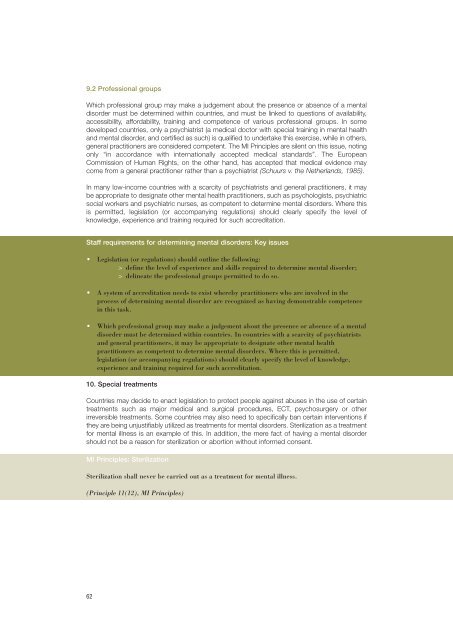human rights and legislation who resource book on mental health
human rights and legislation who resource book on mental health
human rights and legislation who resource book on mental health
You also want an ePaper? Increase the reach of your titles
YUMPU automatically turns print PDFs into web optimized ePapers that Google loves.
9.2 Professi<strong>on</strong>al groups<br />
Which professi<strong>on</strong>al group may make a judgement about the presence or absence of a <strong>mental</strong><br />
disorder must be determined within countries, <str<strong>on</strong>g>and</str<strong>on</strong>g> must be linked to questi<strong>on</strong>s of availability,<br />
accessibility, affordability, training <str<strong>on</strong>g>and</str<strong>on</strong>g> competence of various professi<strong>on</strong>al groups. In some<br />
developed countries, <strong>on</strong>ly a psychiatrist (a medical doctor with special training in <strong>mental</strong> <strong>health</strong><br />
<str<strong>on</strong>g>and</str<strong>on</strong>g> <strong>mental</strong> disorder, <str<strong>on</strong>g>and</str<strong>on</strong>g> certified as such) is qualified to undertake this exercise, while in others,<br />
general practiti<strong>on</strong>ers are c<strong>on</strong>sidered competent. The MI Principles are silent <strong>on</strong> this issue, noting<br />
<strong>on</strong>ly “in accordance with internati<strong>on</strong>ally accepted medical st<str<strong>on</strong>g>and</str<strong>on</strong>g>ards”. The European<br />
Commissi<strong>on</strong> of Human Rights, <strong>on</strong> the other h<str<strong>on</strong>g>and</str<strong>on</strong>g>, has accepted that medical evidence may<br />
come from a general practiti<strong>on</strong>er rather than a psychiatrist (Schuurs v. the Netherl<str<strong>on</strong>g>and</str<strong>on</strong>g>s, 1985).<br />
In many low-income countries with a scarcity of psychiatrists <str<strong>on</strong>g>and</str<strong>on</strong>g> general practiti<strong>on</strong>ers, it may<br />
be appropriate to designate other <strong>mental</strong> <strong>health</strong> practiti<strong>on</strong>ers, such as psychologists, psychiatric<br />
social workers <str<strong>on</strong>g>and</str<strong>on</strong>g> psychiatric nurses, as competent to determine <strong>mental</strong> disorders. Where this<br />
is permitted, <str<strong>on</strong>g>legislati<strong>on</strong></str<strong>on</strong>g> (or accompanying regulati<strong>on</strong>s) should clearly specify the level of<br />
knowledge, experience <str<strong>on</strong>g>and</str<strong>on</strong>g> training required for such accreditati<strong>on</strong>.<br />
Staff requirements for determining <strong>mental</strong> disorders: Key issues<br />
• Legislati<strong>on</strong> (or regulati<strong>on</strong>s) should outline the following:<br />
> define the level of experience <str<strong>on</strong>g>and</str<strong>on</strong>g> skills required to determine <strong>mental</strong> disorder;<br />
> delineate the professi<strong>on</strong>al groups permitted to do so.<br />
• A system of accreditati<strong>on</strong> needs to exist whereby practiti<strong>on</strong>ers <str<strong>on</strong>g>who</str<strong>on</strong>g> are involved in the<br />
process of determining <strong>mental</strong> disorder are recognized as having dem<strong>on</strong>strable competence<br />
in this task.<br />
• Which professi<strong>on</strong>al group may make a judgement about the presence or absence of a <strong>mental</strong><br />
disorder must be determined within countries. In countries with a scarcity of psychiatrists<br />
<str<strong>on</strong>g>and</str<strong>on</strong>g> general practiti<strong>on</strong>ers, it may be appropriate to designate other <strong>mental</strong> <strong>health</strong><br />
practiti<strong>on</strong>ers as competent to determine <strong>mental</strong> disorders. Where this is permitted,<br />
<str<strong>on</strong>g>legislati<strong>on</strong></str<strong>on</strong>g> (or accompanying regulati<strong>on</strong>s) should clearly specify the level of knowledge,<br />
experience <str<strong>on</strong>g>and</str<strong>on</strong>g> training required for such accreditati<strong>on</strong>.<br />
10. Special treatments<br />
Countries may decide to enact <str<strong>on</strong>g>legislati<strong>on</strong></str<strong>on</strong>g> to protect people against abuses in the use of certain<br />
treatments such as major medical <str<strong>on</strong>g>and</str<strong>on</strong>g> surgical procedures, ECT, psychosurgery or other<br />
irreversible treatments. Some countries may also need to specifically ban certain interventi<strong>on</strong>s if<br />
they are being unjustifiably utilized as treatments for <strong>mental</strong> disorders. Sterilizati<strong>on</strong> as a treatment<br />
for <strong>mental</strong> illness is an example of this. In additi<strong>on</strong>, the mere fact of having a <strong>mental</strong> disorder<br />
should not be a reas<strong>on</strong> for sterilizati<strong>on</strong> or aborti<strong>on</strong> without informed c<strong>on</strong>sent.<br />
MI Principles: Sterilizati<strong>on</strong><br />
Sterilizati<strong>on</strong> shall never be carried out as a treatment for <strong>mental</strong> illness.<br />
(Principle 11(12), MI Principles)<br />
62

















